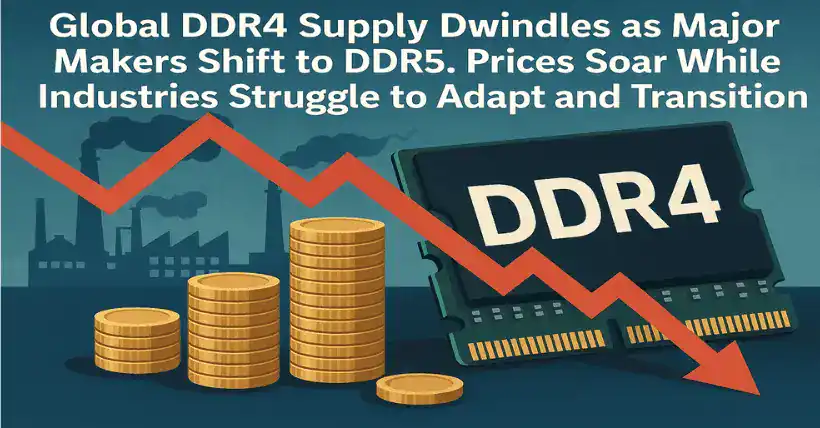Last week, Micron officially notified its customers that it would gradually stop regular shipments of DDR4 and LPDDR4 within the next 2–3 quarters, retaining only directed supply for long-term partners in automotive, industrial, and networking sectors.
In fact, not only Micron, but also Samsung and SK Hynix, the top three global memory manufacturers, have issued similar notifications.
Currently, the DDR4 era is nearing its end. Manufacturers are gradually exiting this low-margin, highly competitive market and shifting production capacity toward higher-value DDR5, LPDDR5, and high-bandwidth memory (HBM) products.
Especially amid the current surge in AI demand—from PCs to servers, smartphones to autonomous driving—the entire industry chain is seeing rising demand for higher-capacity, higher-bandwidth memory, with DDR5 emerging as the next main battlefield.
After manufacturers pulled back from DDR4, the market response was immediate. Since April, DRAM spot market prices have surged. In May alone, prices rose 27%, and in June they spiraled out of control—some specifications spiked by 50%, with some channels even facing stockouts.
According to media reports, multiple stores in Huaqiangbei reported: Want DDR4? No stock! Even old chips that were once piled up in warehouses with no takers are now in high demand. This price surge isn’t speculation, but a real reflection of supply-demand imbalance. Many module makers had long-term partnerships with Samsung, but recently haven’t been able to secure stock and have had to turn to Micron, Nanya Technology, and other suppliers.
Micron’s pricing shot up, with DDR4 prices jumping 50% in June alone, yet the market still faces “prices without supply.” Both 8Gb and 16Gb chips are skyrocketing, with some spot prices even surpassing DDR5.
At this point, Nanya Technology has become one of the few manufacturers still supplying DDR4 in large volumes. Thanks to its solid reputation and flexible production in the Chinese market, the price of its 8Gb DDR4 has reached $2.5—double that of late last year—while 16Gb chips have surged to $6, far exceeding DDR5 of the same specification.
Many people ask: Why not just switch to DDR5?
The key issue is that many industrial, security, TV, and POS terminal devices still heavily rely on DDR4, and the transition isn’t that quick.
About 80–90% of industrial control products are still running on DDR4 systems. Switching to DDR5 would require not only hardware changes, but also redesigns for validation, compatibility, and thermal management—an entire cycle that could take at least six months.
In this situation, with upstream supply cut off and downstream unable to upgrade immediately, the market is trapped in a “blocked behind, unclear ahead” scenario. As a result, terminal manufacturers are scrambling to stock up: clearing inventories while urgently pushing suppliers, creating a dual pressure of “heightened expectations + actual shortages” driving up prices.
At present, although DDR4 prices may gradually stabilize in Q3, the short-term combination of shortages and high prices will persist.
On one hand, manufacturers continue to scale back capacity; on the other, module makers are already running low on inventory. As long as end users can’t switch fast enough to match the pace of manufacturers’ exit, the structural supply-demand tension will be difficult to ease.
Source: Internet

Disclaimer:
- This channel does not make any representations or warranties regarding the availability, accuracy, timeliness, effectiveness, or completeness of any information posted. It hereby disclaims any liability or consequences arising from the use of the information.
- This channel is non-commercial and non-profit. The re-posted content does not signify endorsement of its views or responsibility for its authenticity. It does not intend to constitute any other guidance. This channel is not liable for any inaccuracies or errors in the re-posted or published information, directly or indirectly.
- Some data, materials, text, images, etc., used in this channel are sourced from the internet, and all reposts are duly credited to their sources. If you discover any work that infringes on your intellectual property rights or personal legal interests, please contact us, and we will promptly modify or remove it.



